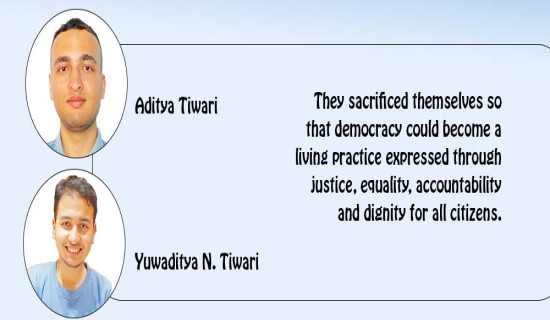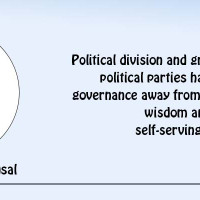- Friday, 30 January 2026
A Bright Star Over The Dark Clouds
Many of us may not have noticed the poetic line "If winter comes, can spring be far behind?" by a romantic English poet. This is the last line from PB Shelley's "Ode to the West Wind" (1820), which foresees the triumph of a glorious future amidst the prevailing gloom. Hope and despair for the poet go side by side, and finally, hope triumphs over the despair. This depiction of optimism in a single poetic line is as simple as it is impactful on human life. The human mind oscillates between the two possibilities – pain and pleasure, sorrow and joy, despair and hope. In these binary pairs, the first are temporary, and the second are permanent phenomena of life. This happens in almost all cultures around the globe.
Nepali society is fast changing, perhaps more rapidly than elsewhere. Looking back at the previous half a century in Nepal, we can find a stable pattern of people's living. Industries were based on agriculture, the rural people used to grow crops on their land for livelihood. There was a subsistence economy with no competition for hoarding more wealth than needed, except that a few landowners owned more land than they could cultivate. Villages were pristine. They were lush with greenery. People were happy with what they had.
But during this half-century period, tremendous changes have taken place. We no longer want to live in the villages. We have almost stopped growing crops in the field, and we import foodstuff from the neighbouring countries. Some industries engaged previously in production have now been closed. The export-import business houses have been growing instead. We are more dependent on remittance money than on domestic production. The consumer pattern is also fast changing.
Migration from village to town has been more rapid than ever before. As a consequence, urbanisation has increased manifold. The most unfortunate condition is in the rural parts of Nepal, especially mid-hills and Himalayas. The villages previously filled with an adequate number of farmers have now turned into deserted villages where cultivated land has been lush with green trees for wild animals to proliferate. Some farmers complain that they cannot keep their crops safe because monkeys and apes trespass on their harvest lands to eat and loot their crops. The mid-hill residents thus migrate to the plains for a supposedly more comfortable life. More than that, many young people migrate to towns searching for government jobs or teaching professions in urban spaces or other service industries.
Consequently, the urban space has been overcrowded, causing environmental pollution detrimental to the health of the urban populace. The larger the urban population, the more hazardous urban life becomes. No one denies this fact, but ironically, no one is ready to return to the pristine village where thousands of ancestors were living happily in the past. Most big cities including the federal capital are turning into urban wilderness to our utter distress. International migration has been more alarming. Many of us think Nepal cannot develop to cater to the needs of people, so it is futile to stay in Nepal. We allow our children to go abroad in the name of higher studies with the deep understanding that they will not return home if they get the job they like.
The weird fact is that many political leaders' children have gone abroad for higher studies and are reluctant to return home. If this trend continues, the entire country will turn into a gloomy station where our youngsters may stay during their adolescence as a brief respite and travel soon to go afar. The next problem in the rural parts is related to the development pattern that is incompatible with the population inhabiting these places. We have been spending a lot of money on building roads to reach otherwise inaccessible places, but those places are gradually depleting. We have opened schools and colleges, but the students are reluctant to study in rural educational institutions. In this sense, we are wasting valuable money on non-productive work.
One bizarre fact regarding these issues is that the political communities want to pretend they are village lovers, which they are not. If we closely study the trend of political communities of the village, most of them have bought houses in towns. Ironically, the urban dwellers show their concerns about rural development. The villagers themselves must be involved in development activities. For reasons above and many others, Nepali people are now frustrated with the country's political, economic, and social conditions. They are heard expressing despair in many affairs. This situation can be likened to a sky cast with dark clouds.
Reverse trend
But the existing situation does not continue for long. No matter how fast this trend grows mainstream, there might nevertheless come a reverse trend, as Shelly envisaged in his poem. As the seasons of nature change every year, people's thinking patterns also change accordingly. Like the cyclicality of natural events, social processes are subject to change to adjust to the changed environment.
Let us imagine what will happen in the world after half a century. In The Clash of Civilisations and Remaking of the World Order (1996), an American political writer, Samuel Huntington, envisages a reverse trend of civilisation and culture. For him, the conflict in the near future will not be between the countries but between the civilisations. In a fierce battle between the civilizations, Western civilisation will decline, and Eastern civilisation will come into the limelight. People will likely migrate to the East from the West when this happens. Then, the Asian continent will flourish to an unexpected level.
Nepal, as an Asian country, is rich in its natural and cultural diversity. Having a temperate climate and fertile land, Nepali migrants will begin to return to their homeland, attracted again by the easy and comfortable life here. There is no reason to deny this possibility. We can see the bright star shining in the sky over the dark clouds.
(The author is the chairman of Molung Foundation. bhupadhamala@gmail.com.)

















